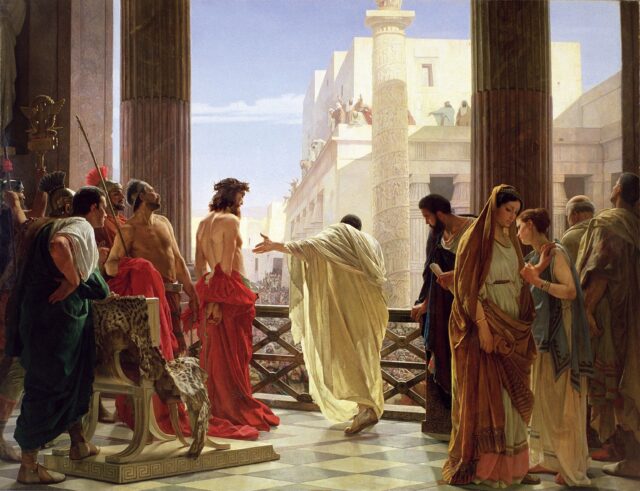- Feb 5, 2002
- 166,632
- 56,265
- Country
- United States
- Faith
- Catholic
- Marital Status
- Married
- Politics
- US-Others
Readers of the four Gospels are struck by the fact that—when Jesus appears before the Roman governor Pontius Pilate—he says nothing in his own defense.
This isn’t just surprising to us; it also was striking to Pilate himself. We’re told:
Pilate said to him, “Do you not hear how many things they testify against you?”
But he gave him no answer, not even to a single charge; so that the governor wondered greatly (Matt. 27:13-14).
What should we make of Jesus’ silence? There have been many proposals.
During his trial, Jesus has been silent, a fact that has no genuine analogies in Greek, Roman, or later Christian trials. Jesus’ silence has often been explained with reference to the silence of the Suffering Servant in Isaiah 53:7 (with whom Jesus is thus identified), but Mark and the other Gospel writers do not alert their readers that such an allusion is intended; or with the silence of the righteous sufferer (Pss 38:14–16; 39:9); as fulfilment of Psalm 22:15; as a reflection of Jesus’ portrayal as a sage or teacher of wisdom; as an expression of self-control and perhaps nobility; as Jesus proving that he is in command or showing his contempt for those who sit in judgment over him; or as showing that he is the eschatological judge before the final verdict (Eckhard Schnabel, Mark: An Introduction and Commentary, at 14:60-61a).
But what’s the real explanation?
Continued below.
This isn’t just surprising to us; it also was striking to Pilate himself. We’re told:
Pilate said to him, “Do you not hear how many things they testify against you?”
But he gave him no answer, not even to a single charge; so that the governor wondered greatly (Matt. 27:13-14).
What should we make of Jesus’ silence? There have been many proposals.
During his trial, Jesus has been silent, a fact that has no genuine analogies in Greek, Roman, or later Christian trials. Jesus’ silence has often been explained with reference to the silence of the Suffering Servant in Isaiah 53:7 (with whom Jesus is thus identified), but Mark and the other Gospel writers do not alert their readers that such an allusion is intended; or with the silence of the righteous sufferer (Pss 38:14–16; 39:9); as fulfilment of Psalm 22:15; as a reflection of Jesus’ portrayal as a sage or teacher of wisdom; as an expression of self-control and perhaps nobility; as Jesus proving that he is in command or showing his contempt for those who sit in judgment over him; or as showing that he is the eschatological judge before the final verdict (Eckhard Schnabel, Mark: An Introduction and Commentary, at 14:60-61a).
But what’s the real explanation?
Continued below.

